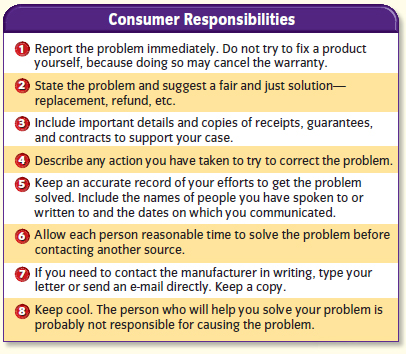Consumerism
- Details
- Category: Economics
- Hits: 5,860
Most Americans are concerned with the reliability of the products and services they use. Many private groups and government agencies work to ensure the well-being of consumers. Consumers themselves, however, must be well informed about potential issues with products and services they purchase, and they must be proactive in their buying habits. In this section, you’ll read more about consumer rights and responsibilities.
Consumer Rights
Legislative protection of consumer rights has grown steadily since the 1960s.
Economics & You Have you ever been dissatisfied with a product you bought? Did you take steps to fix the problem? Read on to learn about your rights as a consumer.
Consumerism is a movement that started in the 1960s to educate buyers about the purchases they make and to demand better and safer products from manufacturers. Businesses can no longer assume it is the buyer’s responsibility to know whether a product is safe, food is healthful, or advertising is accurate.
In 1962 President John F. Kennedy sent the first consumer protection message to Congress. In the message, he outlined four consumer rights:
- the right to safety—protection against goods that are dangerous to life or health.
- the right to be informed— information for use not only as protection against fraud but also as the basis for reasoned choices.
- the right to choose—the need for markets to be competitive and for government to protect consumers in markets where competition does not always exist, such as electric service.
- the right to be heard—the guarantee that consumer interests will be listened to when laws are being written.
President Richard Nixon later added a fifth right:
- the right to redress—the ability to obtain from the manufacturers adequate payment in money or goods for financial or physical damages caused by their products.
Consumer Responsibilities
Consumers can resolve problems most effectively by accepting certain responsibilities.
Economics & You Take a moment to think about your responsibilities at home, work, and school. Then read on to learn about your responsibilities as a consumer.
Using President Kennedy’s list, Congress passed consumer protection legislation. Today, consumers dissatisfied with a specific product can complain to the store manager or to the manufacturer. They also may take the case to small-claims court. In addition, many private and government agencies are available to help consumers.
Among the private groups that aid consumers are local citizens’ action groups and local chapters of the Better Business Bureau, found in many major cities and some smaller ones. These bureaus give consumers information on products and selling practices and help settle disagreements between buyers and sellers. Numerous state and federal agencies also have programs to aid consumers.
You have consumer responsibilities as well as rights. If a product or service is faulty, it is the consumer’s responsibility to initiate the problem-solving process. See Figure 3.4 below for a list of steps for consumers to take, as recommended by the Bureau of Consumer Protection.

Figure 3.4 The Consumer’s Role
Chances are, one day you will have a problem with a product or service and will need to seek a replacement product or a refund. This process will be much simpler if you keep careful records of your purchases and always retain your receipts. If you do have a problem with a product or service, the Bureau of Consumer Protection suggests you take the steps listed in the chart on the right.
The era of online shopping has presented some new challenges for consumers who use the Internet to make purchases. If you choose to shop online, you have the responsibility to make sure you are buying from a reputable, trustworthy source. Be sure to read any confidentiality and disclosure agreements. Also, remember that you should never enter your personal and financial information into a link that was sent to you by a business or company.
Another responsibility of consumers is to exhibit ethical behavior by respecting the rights of producers and sellers. For example, a responsible consumer will not try to return a used item just because it has been advertised elsewhere for a lower price. It’s better to research various prices before you make a purchase.
- consumerism: movement to educate buyers about the purchases they make and to demand better and safer products from manufacturers
- ethical behavior: acting in accordance with moral convictions about right and wrong
- Sellers’ Rights You have the responsibility to behave ethically if you need to return a product or get a refund on a service. You should not return a product just because you find the item at a lower price elsewhere.
Also, you should never try to return a product that has been damaged through your own actions.